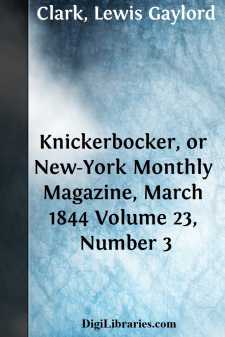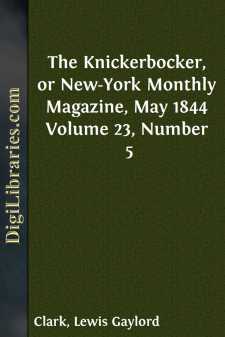Categories
- Antiques & Collectibles 13
- Architecture 36
- Art 48
- Bibles 22
- Biography & Autobiography 813
- Body, Mind & Spirit 142
- Business & Economics 28
- Children's Books 16
- Children's Fiction 13
- Computers 4
- Cooking 94
- Crafts & Hobbies 4
- Drama 346
- Education 46
- Family & Relationships 57
- Fiction 11829
- Games 19
- Gardening 17
- Health & Fitness 34
- History 1377
- House & Home 1
- Humor 147
- Juvenile Fiction 1873
- Juvenile Nonfiction 202
- Language Arts & Disciplines 88
- Law 16
- Literary Collections 686
- Literary Criticism 179
- Mathematics 13
- Medical 41
- Music 40
- Nature 179
- Non-Classifiable 1768
- Performing Arts 7
- Periodicals 1453
- Philosophy 64
- Photography 2
- Poetry 896
- Political Science 203
- Psychology 42
- Reference 154
- Religion 513
- Science 126
- Self-Help 84
- Social Science 81
- Sports & Recreation 34
- Study Aids 3
- Technology & Engineering 59
- Transportation 23
- Travel 463
- True Crime 29
Knickerbocker, or New-York Monthly Magazine, March 1844 Volume 23, Number 3
Description:
Excerpt
This question has often been asked but seldom answered satisfactorily. Newspaper editors and correspondents have frequently attempted a practical elucidation of the mystery, by quoting from their own brains the rarest piece of absurdity which they could imagine, and entitling it ‘Transcendentalism.’ One good hit of this kind may be well enough, by way of satire upon the fogginess of certain writers who deem themselves, and are deemed by the multitude, transcendental par excellence. Coleridge however thought that to parody stupidity by way of ridiculing it, only proves the parodist more stupid than the original blockhead. Still, one such attempt may be tolerated; but when imitators of the parodist arise and fill almost every newspaper in the country with similar witticisms, such efforts become ‘flat and unprofitable;’ for nothing is easier than to put words together in a form which conveys no meaning to the reader. It is a cheap kind of wit, asinine rather than attic, and can be exercised as well by those who know nothing of the subject as by those best acquainted with it. Indeed, it is greatly to be doubted whether one in a hundred of these witty persons know any thing of the matter; for if they possess sense enough to make them worthy of being ranked among reasonable men, it could be proved to them in five minutes that they are themselves transcendentalists, as all thinking men find themselves compelled to be, whether they know themselves by that name or not.
‘Poh!’ said a friend, looking over my shoulder; ‘you can’t prove me a transcendentalist; I defy you to do it; I despise the name.’
Why so? Let us know what it is that you despise. Is it the sound of the word? Is it not sufficiently euphonious? Does it not strike your ear as smoothly as Puseyite, or Presbyterian?
‘Nonsense!’ said he; ‘you don’t suppose I am to be misled by the sound of a word; it is the meaning to which I object. I despise transcendentalism; therefore I do not wish to be called transcendentalist.’
Very well; but we shall never ‘get ahead’ unless you define transcendentalism according to your understanding of the word.
‘That request is easily made, but not easily complied with. Have you Carlyle or Emerson at hand?’
Here I took down a volume of each, and read various sentences and paragraphs therefrom. These passages are full of transcendental ideas; do you object to them?
‘No,’ said my friend; ‘for aught I can perceive, they might have been uttered by any one who was not a transcendentalist. Let me see the books.’
After turning over the leaves a long while, he selected and read aloud a passage from Carlyle, one of his very worst; abrupt, nervous, jerking, and at the same time windy, long-drawn-out, and parenthetical; a period filling a whole page.
‘There,’ said he, stopping to take breath, ‘if that is not enough to disgust one with transcendentalism, then I know nothing of the matter.’
A very sensible conclusion. Bless your soul, that is Carlyle-ism, not transcendentalism. You said but now that you were not to be misled by the sound of a word; and yet you are condemning a principle on account of the bad style of a writer who is supposed to be governed by it. Is that right? Would you condemn Christianity because of the weaknesses and sins of one of its professors?
‘Of course not,’ replied he; ‘I wish to be fair. I cannot express my idea of the meaning of transcendentalism without tedious circumlocution, and I begin to despair of proving my position by quotations. It is not on any particular passage that I rest my case. You have read this work, and will understand me when I say that it is to its general intent and spirit that I object, and not merely to the author’s style.’
I think I comprehend you. You disregard the mere form in which the author expresses his thoughts; you go beyond and behind that, and judge him by the thoughts themselves; not by one or by two, but by the sum and substance of the whole. You strip off the husk to arrive at the kernel, and judge of the goodness of the crop by the latter, not the former.
‘Just so,’ said he; ‘that’s my meaning precisely. I always strive to follow that rule in every thing. ‘Appearances,’ you know, ‘are deceitful.’’
That is to say, you go beyond or transcend appearances and circumstances, and divine the true meaning, the substance, the spirit of that on which you are about to decide. That is practical transcendentalism, and you are a transcendentalist....




